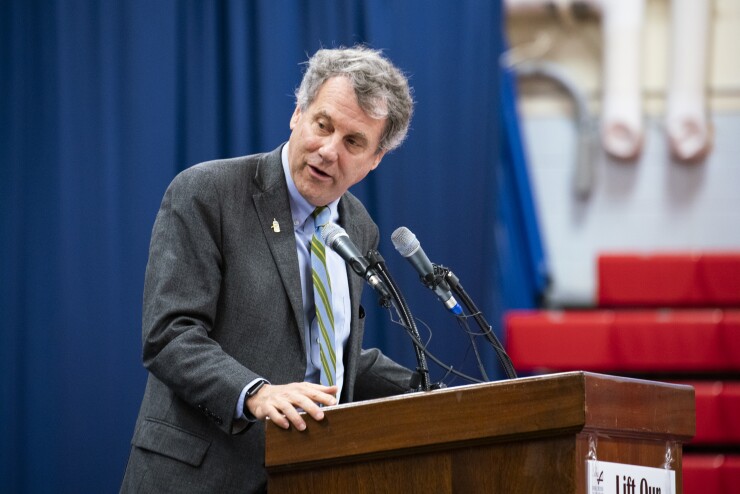WASHINGTON — Cratered support among the Republican base, new priorities in the banking industry and simple pragmatism have significantly weakened the relationship between banks and the GOP, and opened up room for modest but increasing partnerships with congressional Democrats, in a role reversal that would have been unthinkable just a decade ago.
"About four in ten Republicans and Republican-leaning independents (38%) and Democrats and Democratic leaners (41%) now say banks and other financial institutions have a positive effect on the way things are going in the country," Pew Research wrote in a piece on the study.

This represents a steep decline, since as recently as 2019, 63% of Republican voters thought banks had a positive effect on the country, as opposed to 37% of Democrats. Experts say that while banks have long faced bipartisan criticism, the GOP's culture war has worsened banks' already dwindling favor among the GOP base, and fractured the party's historically finance-friendly reputation.
In the midst of this decoupling, and with the GOP engaged in an unpredictable culture war, Democrats and banks appear to be increasingly siding with the devil they know, at least in certain areas where their policy priorities align.
Ian Katz, managing director at Capital Alpha Partners, agrees that populist sentiment in the Republican Party has been growing for some time now. In the era of increasing politicization of social and cultural issues, Republicans see anti-wokeness as a political strategy that resonates with their base.
"Republicans in Congress have become less like the pro-business, free-trade Republicans of a decade or more ago," Katz said. "They are more populist now. They were moving in that direction, but Trump accelerated it. So now Republicans in Congress aren't the reliable defenders of banks that they used to be. I think in the past year or two the trend has accelerated even more because of Republican suspicions that banks are adopting the Democrats' views on issues such as [environmental, social and corporate governance matters] and inclusion."
Those concerns have been strengthened in the wake of crypto scandals like the precipitous decline of the crypto exchange FTX and recent indictment of the owner of Hong Kong-based
By contrast, many GOP lawmakers worry more about the dangers of regulatory overreach than the dangers of underregulated financial firms. Biden-appointed bank regulators and Republicans
The increasing trend for banks to employ values-based investment practices, which consider an ESG framework, has also caused friction with Republicans. The GOP
Republican staff of the Senate Banking Committee released a report recently floating the idea of
Consumer advocates like Carter Dougherty of Americans for Financial Reform say the wedge between the GOP and banks has been growing for some time, suggesting ESG outrage is merely a symptom of broader disenchantment that Americans feel toward financial services writ large.
"The change here is that there is more bipartisan criticism of Wall Street in Congress," Dougherty said in an email. "For over a decade, the country as a whole, across both parties, has been bank-critical, and supportive of efforts by Congress to be tough on Wall Street. The 2008 crisis and the Great Recession left deep scars on this country."
But other observers say growing Republican hostility may drive banks towards working increasingly with the left. Former Federal Deposit Insurance Corp. lawyer and independent consultant Todd Phillips says that banks have a real interest in currying favor with
"I think it's almost a perfect storm that is helping the banks gain ground with Democrats," Phillips said. "Banks are really just trying to do what they think is in their own economic interest. It's just really strange that we have the party of free markets that is trying to tell banks what to do, and I think that's fracturing the bond between banks and Republicans that's been building for about a decade now."






